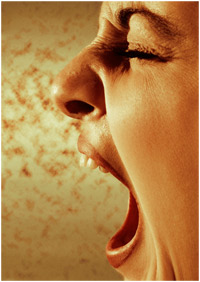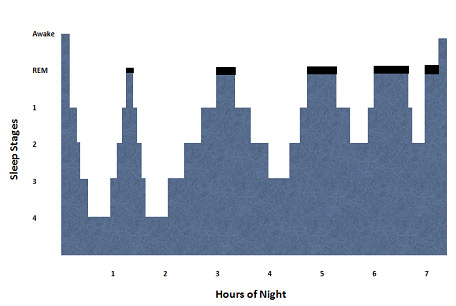About Sleep
About Sleep | Sleep Hygiene | Common Myths About Sleep | Sleep Disorders

Our bodies regulate sleep in much the same way that they regulate eating, drinking, and breathing. Getting an adequate amount of sleep is one of the building blocks of good health. Studies show that those who don't get an enough sleep are not likely to live as long as those who do.
Many people think of sleep as a passive activity, but sleep is actually an active state. It restores us, helps the body to repair damage and grow new cells. It keeps the body's nervous system working properly and helps us to consolidate memory (helps us to remember what we learned during the day).
 Chronic Sleep Deprivation can contribute to Cardiovascular Disease such as Hypertension and Stroke. This may also have an impact on obesity and weight gain as the control of some of the hormones that regulate appetite and hunger are compromised, which in turn promotes eating and weight gain.
Chronic Sleep Deprivation can contribute to Cardiovascular Disease such as Hypertension and Stroke. This may also have an impact on obesity and weight gain as the control of some of the hormones that regulate appetite and hunger are compromised, which in turn promotes eating and weight gain.
Most adults need at least 7 to 8 hours of sleep per night, although some people may need as little as 5 hours or as many as 10 hours.
Throughout the night at different times, your sleep actually occurs in stages, which are broken into two major divisions of our sleep state. These are called rapid eye movement (REM) sleep, and non-rapid eye movement (Non-REM) sleep. Non-REM sleep is in turn further divided into four different stages (1, 2, 3 and 4), with stages 3 and 4 often referred to as "deep sleep."
Throughout the night these stages alternate in cycles of around 90-120 minutes.

What role does each stage of sleep play?
NREM (75% of night): As we begin to fall asleep, we enter NREM sleep.
Stage 1 (5% of night):
* Between being awake and falling asleep
* Light sleep
* Eyes are moving very slowly
* Muscle activity slows down
Stage 2 (45% of night):
* Onset of sleep
* Becoming disengaged from surroundings
* Breathing and heart rate are regular
* Eye movements cease
* Body temperature drops (so sleeping in a cool room is helpful)
Stages 3 and 4 (25% of night):
* Occurs mostly in the first third of the night and decreases in each cycle.
* Deepest and most restorative sleep
* Blood pressure drops
* Breathing becomes slower
* Muscles are relaxed
* No eye movements
* Supply of blood to muscles increases
* Tissue repair and growth occurs
* Energy is restored
* Hormones are released such as: Growth hormone which is essential for growth and muscle development
REM (25% of night):
* First occurs about 90 minutes after falling asleep
* Recurs on average every 90 minutes, getting longer each time as the night progresses
* Provides energy to brain and body
* Supports daytime performance
* Brain is active and dreams occur
* Heart rate increases
* Breathing is rapid, irregular and shallow
* Eyes dart back and forth
* Body becomes immobile and relaxed, as muscles are "turned off"
If sleep is not regular and it is interrupted, then sleep is classified as fragmented and leads to the symptoms that cause patients to seek treatment.

